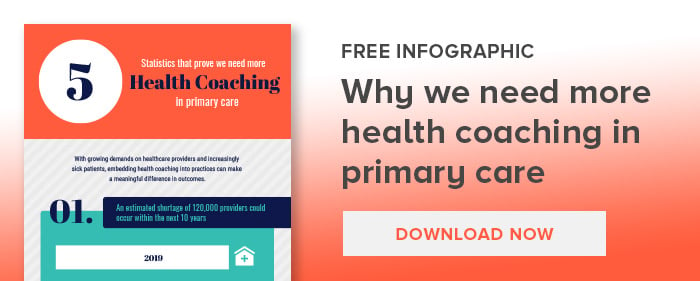With growing demands on healthcare providers and increasingly sick patients, embedding health coaching into practices can make a meaningful difference in outcomes.
You’ve likely heard of a health coach. In the fitness industry, health coaches often play an active role in helping people create sustainable habits related to exercise (and sometimes nutrition) goals. Motivated people will hire health coaches to help them change behavior, but what about the average patient whose physicians tell them every year, “you need to exercise more and eat better”?
Helping these individuals find motivation and create change is a difficult job, but that’s why more healthcare practices need to equip their teams to serve as health coaches.
Allied health professionals, such as medical assistants, as well as nurses, social workers, dietitians or other clinical professionals are capable of learning and practicing health coaching skills with patients. Working closely with physicians and advanced practice clinicians to support recommended care plans, health coaches can provide support to patients by identifying small behavior changes that will help them achieve a healthier lifestyle.
Today’s healthcare environment requires forward-thinking education and training to help reduce the rate of chronic disease. When those who help teach healthcare skills – either through a school or on the job – begin to view health coaching as a vital skill for the success of both employees and our healthcare system, we will begin seeing real health improvements.
Here are five compelling statistics that point to a growing need for health in primary care.
1. An estimated shortage of 120,000 providers could occur within the next 10 years.
As the US population ages, the demand for medical services is increasing, but the number of physicians is decreasing. As the shortage grows, patients have become accustomed to waiting a long time to see their provider, only to have a rushed and sometimes impersonal visit. Health coaches can provide more continuity and support for patients in between visits, giving each patient the dedicated time they need to help them understand care plans, medications, and how to make lifestyle changes.
2. According to the CDC, 60% of Americans have at least one chronic disease. 40% have two or more.
Risk factors for most chronic diseases can be reduced through lifestyle and behavior changes. Arming clinicians with health coaching skills that tap into individuals’ motivations to change can result in improvements in blood glucose, blood pressure, cholesterol, metabolic function, inflammation and more.
3. Only about 6% of Americans include the top five behaviors for preventing chronic disease in their daily routine.
Getting regular exercise, maintaining a healthy weight, not smoking, drinking alcohol in moderation or not at all, and getting seven to eight hours of sleep each day are the top five behaviors for preventing chronic disease. With so few people including these healthy habits in their daily routines, there’s great opportunity for health coaches to help patients improve their health by implementing small changes towards these behaviors.
4. 91% of patients said they need more help with chronic disease management.
A survey conducted by West Health Care shows that health care providers are not able to deliver the services patients need to help with chronic disease management. Patients report needing more engagement with their health care team – which often requires more time than physicians can provide to patients. Health coaches can step in, spend more time with patients and help answer any questions they may have about their visit and their care instructions from the doctor.
5. Only 30% of patients reported that their providers check in with them regularly between office visits.
Health coaches can support physicians by maintaining engagement with patients who are trying to improve their chronic conditions. By developing deep relationships with patients and reaching out to them between visits, health coaches can help patients work through at-home challenges and keep them motivated to continue their journey towards better health.
There are a number of programs available to train clinicians on health coaching, some lead to a certification, while others are simply programs that result in earning a certificate that acknowledges learners have mastered the content within the training. Find a program that works for your organization, giving your clinicians the appropriate skills to bring health coaching to patients who need more support.
Together, patients and their coaches have the power to completely transform the patient experience. Don’t know where to start? We can help, click below to learn more about NHA’s Principles of Health Coaching™ product.






